
Source: Courtesy of Wikimedia Commons
MELANSON, OLIVIER-MAXIMIN, businessman and politician; b. 2 July 1854 in Haute-Aboujagane, N.B., son of Maximin Melanson and Julie Le Blanc; m. February 1878 Marguerite Boudreau in Barachois, N.B., and they had 11 children; d. 7 July 1926 in Moncton, N.B., and was buried in nearby Shediac.
Olivier-Maximin Melanson studied at the elementary school in his native village. Like many other farmers’ sons, he was unable to continue his schooling for lack of money. The favourable economic climate probably encouraged him to undertake a career in business, which, until then, had been virtually restricted to an English-speaking elite. He settled in Shediac. With a salt-water port close by, rapidly expanding railway services, and abundant natural resources, this village in the 1870s was well on the way to becoming an important centre for exporting products such as lumber, potatoes, fish, and lobster to the United States, Europe, and the West Indies.
At the beginning of the 1870s, Melanson worked there as a clerk in a store owned by Fidèle Poirier, a brother of the future senator Pascal Poirier*. This experience with the first Acadian merchant in Shediac was evidently beneficial, since he became co-owner with one of Poirier’s sons, André, of a general store in 1873. The following year he opened his own store, which proved so profitable that he was able to buy a large number of parcels of agricultural land as well as numerous lobster processing plants. This diversification enabled him to survive periods of stress and economic difficulty. For many years Melanson was one of the leading exporters of potatoes and eggs from southeastern New Brunswick. In 1887, for example, he shipped 40,000 dozen eggs by rail, enough to fill 45 rail cars, each holding $200 to $300 worth of goods. To remain competitive, he adopted some of the practices of his rivals. For many years the most important of these was Chesley Tait, who was the first to develop the potato industry in the Shediac region. To facilitate the export of his merchandise, Melanson built large potato storehouses near the railway lines. A typical storehouse might have been a storey and a half high, 60 feet long, and 35 feet wide. He paid his employees in wooden or cardboard tokens, redeemable only at his store. The value of his company’s capital increased from $1,000 in 1881 to $99,000 in 1910. Melanson’s career was so successful financially that at the time of his death, Placide Gaudet would refer to him as the first Acadian millionaire.
Melanson was also active in politics. He made an unsuccessful attempt in 1881 to win a seat on the Westmorland County Council. He had more success in 1903, when he became a municipal councillor in Shediac, which had been incorporated as a town in that year. His objective at the time was to promote the interests of his fellow Acadians.
On the provincial scene, Melanson was one of the first Acadians from the southeast to run for election in the riding of Westmorland, to win the seat, and to give speeches in French in the Legislative Assembly. A Conservative in politics, he was successful in the general elections of 20 Jan. 1890, 18 Feb. 1899, and 20 June 1912. He was defeated on 22 Oct. 1892, 28 Feb. 1903, and 3 March 1908. He was not a candidate in the 1895 election. On 4 March 1914 he became deputy speaker of the Legislative Assembly, replacing Walter Brittain Dickson, who was absent because of illness. On Dickson’s death, Melanson took over his position on 9 March 1916, becoming the second Acadian in the Maritime provinces to hold such an office, after Stanislaus Francis Perry*, who had been speaker of the Prince Edward Island Assembly in 1873–74. When a general election was called in New Brunswick in 1917, Melanson bowed out of political life, citing medical reasons. Thereafter, he devoted himself to his business activities, which his children carried on after his death.
A self-educated merchant and politician, Olivier-Maximin Melanson bore witness to the dynamism and strength of will shown by the Acadians of the late 19th and early 20th centuries. They laid the bases for economic success and political involvement, which hitherto had been mainly restricted to the English-speaking community. From then on, they could look forward to a promising future in New Brunswick.
PANB, MC 1156; RS141A1b, F18776, 30 July 1887 (mfm.); RS141C5.46, F18949, 7 July 1926 (mfm.). L’Évangéline (Moncton, N.-B.), 8, 15 juill. 1926. J. E. Belliveau, Running far in: the story of Shediac (Windsor, N.S., 1977). Régis Brun, Shediac: l’histoire se raconte (Sackville, N.-B., 1994). Diane Myles, Speakers of the Legislative Assembly, Province of New Brunswick, 1786–1985 (Fredericton, 1986). Vital statistics from N.B. newspapers (Johnson), vols.43, 46.
Lewis LeBlanc, “MELANSON, OLIVIER-MAXIMIN,” in Dictionary of Canadian Biography, vol. 15, University of Toronto/Université Laval, 2003–, accessed November 28, 2024, http://www.biographi.ca/en/bio/melanson_olivier_maximin_15E.html.
The citation above shows the format for footnotes and endnotes according to the Chicago manual of style (16th edition). Information to be used in other citation formats:
| Permalink: | http://www.biographi.ca/en/bio/melanson_olivier_maximin_15E.html |
| Author of Article: | Lewis LeBlanc |
| Title of Article: | MELANSON, OLIVIER-MAXIMIN |
| Publication Name: | Dictionary of Canadian Biography, vol. 15 |
| Publisher: | University of Toronto/Université Laval |
| Year of publication: | 2005 |
| Year of revision: | 2005 |
| Access Date: | November 28, 2024 |